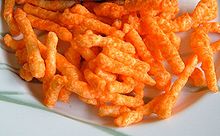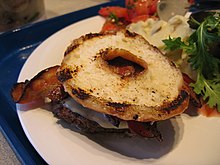Junk food
This article needs additional citations for verification. (August 2008) |


Junk food is an informal term applied to some foods which are perceived to have little or no nutritional value, or to products with nutritional value but which also have ingredients considered unhealthy when regularly eaten, or to those considered unhealthy to consume at all. The term was coined by Michael Jacobson, director of the Center for Science in the Public Interest, in 1972.[1]
Foods more likely to be considered junk food generally are those that are more convenient and easy to obtain in a ready-to-eat form, though being such does not automatically define the food as "junk food."
Marketing
During 2006, in the United Kingdom, following a high profile media campaign by the chef Jamie Oliver and a threat of court action from the National Heart Forum[2], the UK advertising regulator and competition authority, Ofcom, launched a consultation on advertising of foods to children.[3] The Food Standards Agency was one of many respondents.[4] As a result, a ban on advertising during children's television programmes and programmes aimed at school aged children (5-16) was announced.[5] The ban also includes marketing using celebrities, cartoon characters and health or nutrition claims.
Health Effects
A study by Paul Johnson and Paul Kenny at The Scripps Research Institute suggested that junk food has addictive properties, similar to heroin. [6] After five days on a junk food diet, the pleasure centers of rat brains became desensitized, requiring more food for pleasure. After the junk food was taken away and replaced with a healthy diet, the rats starved for two weeks instead of eating nutritious fare.
References
- ^ O'Neill, Brendon (2006-11-27). "Is this what you call junk food?". BBC News. Retrieved 2006-11-27.
- ^ The Guardian (Felicity Lawrence) Heart campaigners drop case over junk food ad ban 22 June 2006
- ^ Television advertising of food and drink products to children - Options for new restrictions
- ^ Food Standards Agency Board responds to Ofcom consultation
- ^ "Junk food ad crackdown announced". BBC News. 2006-11-17. Retrieved 2006-11-28.
- ^ Johnson, Paul M.; Kenny, Paul J. (2010). "Dopamine D2 receptors in addiction-like reward dysfunction and compulsive eating in obese rats". Nature Neuroscience. doi:10.1038/nn.2519.
{{cite journal}}:|access-date=requires|url=(help)
